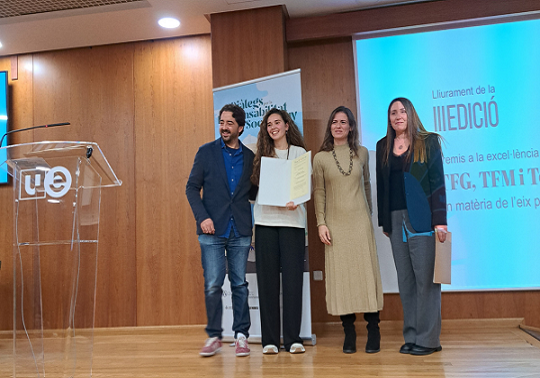2023
During its first year of implementation, the GENERIZA project was developed under the title Promoting the Gender Perspective in University Teaching, Learning and Student Research (Code: NOU_PID, UV-SFPIE_PID-2079003). This initial phase included several activities aimed at fostering the integration of the gender perspective into academic practice:
- Implementation of shared and distance international teaching between lecturers and students from the three participating universities (Valencia, Rome and Peru), focused on gender-based learning.
Organisation of training workshops with specialists to strengthen the links between the university and its social, associative and international environment, as well as to diversify teaching content. Highlights include:
- Where Are the Women? Literature and Activism Against Gender Violence, delivered by Dr Angela di Matteo, Professor of Literature at Roma TRE University.
- Conversation with Eva Perarnau, author of Aceras, a novel addressing the coming-out story of a young lesbian during late Francoism.
- Workshop on Gender and Historical Memory Through Photojournalism and Research, led by photojournalist Eva Mañez, who presented her book Paterna: The Memory of Horror.
2024
The project was renewed under the title Videos for Equality: Collaborative Learning with a Gender Perspective (Code: 2735719). In this phase, a co-creation methodology for audiovisual resources was applied across different courses to foster active student learning and promote the integration of gender perspective in higher education.
- Gender Policies and Discourse Theories (Bachelor’s Degree in Audiovisual Communication, University of Valencia), taught by the project coordinator.
- Hispanic American Literature (Bachelor’s Degree in Hispanic Studies, Roma TRE University, Italy), taught by Professor Angela Di Matteo, project team member.
This methodology seeks to engage students in their own learning process and encourage the creation of curricular content through collaborative work focused on producing audiovisual materials on gender and equality.
Among the outcomes, 16 audiovisual productions were created: 12 educational capsules and 4 informative videos focusing on different gender-equality topics.
The project collaborated with civil society organisations such as Tela para el Kambio, dedicated to the education of vulnerable girls, and SomLlar Association, which provides comprehensive support to young people at risk of social exclusion.
Additionally, several training and dissemination activities were organised:
- Training talk Gender Perspective in Development Cooperation, by Cristina Vallejo Abad, development worker and coordinator of Tela para el Kambio, and member of GENERIZA (31 October 2023).
- Open debate The Social and Labour Challenges of Young Women: Present and Future in Valencian Audiovisual Media (14 March).
- Lecture Figures of Desire: From Marcel Proust to Chantal Akerman, by Dr Uta Fleten, Professor at the University of Leipzig.
- Debate Literature and Journalism Against LGTBIphobia in Repressive Contexts, with Trifonia Melibea Obono and Murad Udeh (6 May, Cultural Space, Faculty of Philology, Translation and Communication).
2025
The project was renewed under the title GENERIZA: Co-Teaching and Collaborative Learning for Equality (Code: 3320651). Within this new edition, several actions were developed to promote teaching innovation and gender equality in higher education:
- Implementation of the flipped classroom methodology and distance teaching experiences among participating institutions.
- Organisation of the 2nd International Conference of the Project, focused on exchanging best practices and strengthening academic networks around gender equality in higher education.
2026
The project has been renewed for the fourth consecutive year under the title Towards an Equal and Inclusive Technology: Raising Awareness of Gender Bias in Artificial Intelligence (Code: 3900174). Its main goal is to promote students’ critical thinking regarding gender-biased content in digital and technological platforms, with special attention to that generated by generative artificial intelligence.












